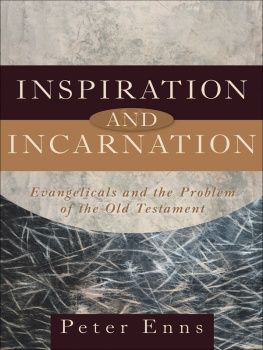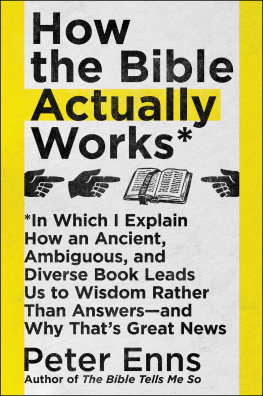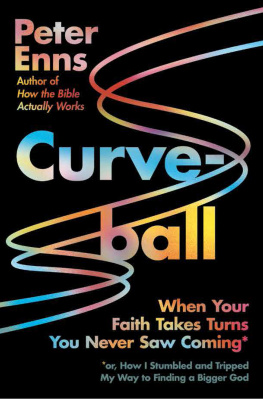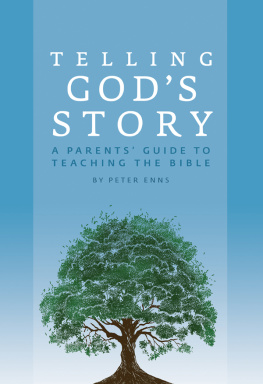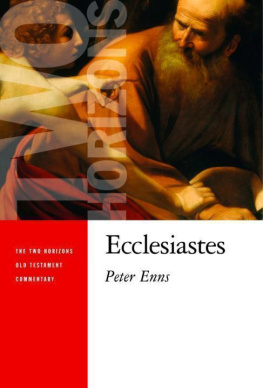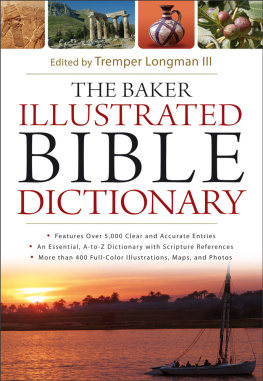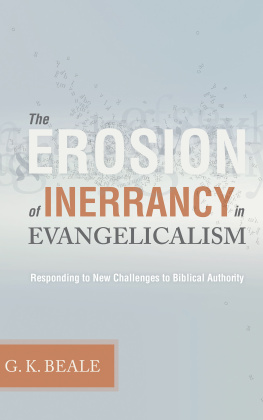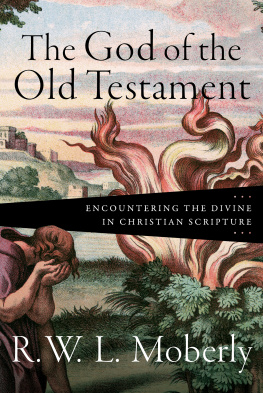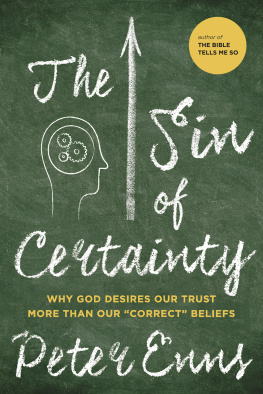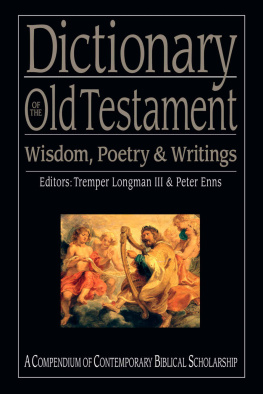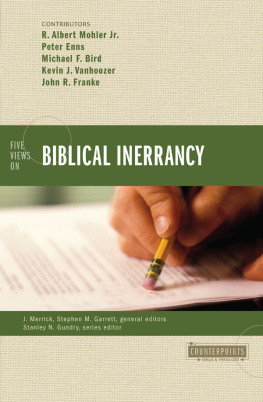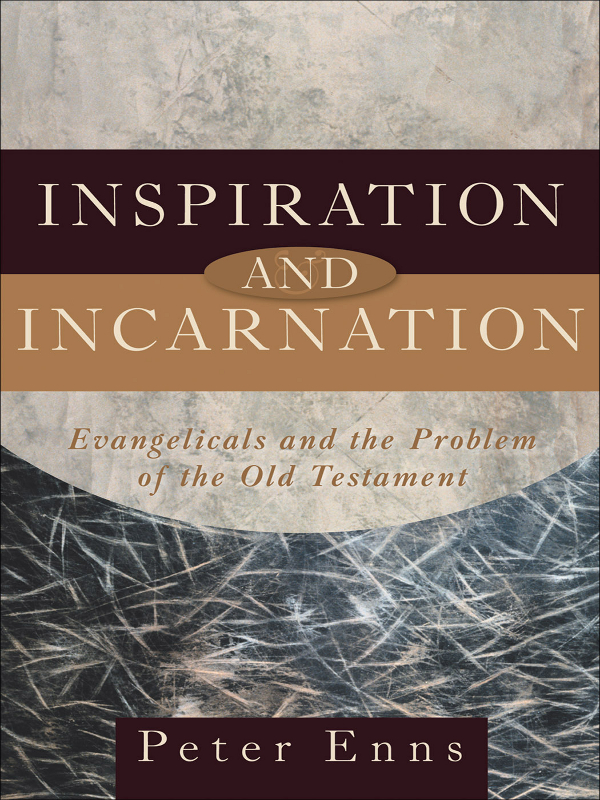
INSPIRATION
AND
INCARNATION
INSPIRATION
AND
INCARNATION
Evangelicals and the Problem
of the Old Testament
Peter Enns

2005 by Peter Enns
Published by Baker Academic
a division of Baker Publishing Group
P.O. Box 6287, Grand Rapids, MI 49516-6287
www.bakeracademic.com
E-book edition created 2011
All rights reserved. No part of this publication may be reproduced, stored in a retrieval system, or transmitted in any form or by any meansfor example, electronic, photocopy, recordingwithout the prior written permission of the publisher. The only exception is brief quotations in printed reviews.
ISBN 978-1-4412-0067-9
Library of Congress Cataloging-in-Publication Data is on file at the Library of Congress, Washington, DC.
Unless otherwise indicated, all Scripture quotations are from the Holy Bible, New International Version. NIV. Copyright 1973, 1978, 1984 by Biblica, Inc. Used by permission of Zondervan. All rights reserved worldwide. www.zondervan.com
Quotations of the Old Testament Apocrypha are from the New Revised Standard Version of the Bible, copyright 1989, Division of Christian Education of the National Council of the Churches of Christ in the United States of America. Used by permission. All rights reserved.
For
Erich, Elizabeth, and Sophia
Thats a really good question....
Contents
The aim of this book is not novelty but synthesis. My focus is twofold: (1) to bring together a variety of data that biblical scholars work with every day for readers who do not have firsthand familiarity with these data and (2) to look at these data with a clear view toward discussing their implications for an evangelical doctrine of Scripture.
Although it is not always made explicit, in working through these issues I lean heavily on the work of many scholars, some of whom are listed in the Further Reading sections at the end of each chapter. Also influential has been my own theological tradition, represented by my colleagues at Westminster Theological Seminary, past and present, and the wider tradition of which that institution is a part. This is not to imply that I speak for that institution or tradition. Nevertheless, I am thankful for being part of such a solidly faithful group that does not shy away from some difficult yet basic questions and with whom I am able to have frank and open discussions. This does not happen at every institution, and I do not take that privilege for granted.
Biblical citations are quoted from the New International Version, except where noted. Apocryphal material (i.e., the Wisdom of Solomon in chapter 4) is quoted from the New Revised Standard Version. With the exception of the Code of Hammurabi, which is quoted from James Pritchards Ancient Near Eastern Texts (though I have modernized it in places), the ancient Near Eastern texts in chapter 2 are quoted from TheContext of Scripture by W. W. Hallo and K. L. Younger. In chapter 4, the pseudepigraphal texts are quoted from James Charlesworths Old Testament Pseudepigrapha and the Dead Sea Scrolls from G. Vermess DeadSea Scrolls in English. Full bibliographic data for these works is given in the Further Reading sections at the end of the respective chapters.
Key terms and concepts, especially those that may be unfamiliar to the reader, are defined in the glossary and appear in boldface type on first mention in the text.
I would like to take this opportunity to thank my editor, Jim Kinney, who has spent much time interacting with me on this project. My former student, Shannon Geiger, now a church planter in Dallas, Texas, spent many hours reading an earlier draft of this book and made numerous invaluable suggestions. This is a better book for her efforts.
I believe with all my heart that honesty with oneself is a central component to spiritual growth. God honors our honest questions. He is not surprised by them, nor is he ashamed to be our God when we pose them. He is our God, not because of the questions we ask (or refrain from asking), but because he has united us to the risen Christ. And being a part of Gods family is ultimately a gift to us, not something to be obtained by us. God has freed us in Christ and made us his children. And, as all children do, we ask a lot of questions.
| RSV | Holy Bible: Revised Standard Version |
| TNIV | Holy Bible: Todays New International Version |
| Wis. | Wisdom of Solomon |
What I Hope to Accomplish in This Book
The purpose of this book is to bring an evangelical doctrine of Scripture into conversation with the implications generated by some important themes in modern biblical scholarshipparticularly Old Testament scholarshipover the past 150 years. To put it this way is to suggest that such a conversation has not taken place, at least not to the degree that it could have. It is not to suggest, however, that evangelical biblical scholarship has not engaged many of these issues responsibly on an academic level. There is no question that evangelical scholars have made many excellent contributions, for example, in archeological, historical, and textual studies.
In my view, however, what is needed is not simply for evangelicals to work in these areas, but to engage the doctrinal implications that work in these areas raises. Without wanting to overstate the matter, I know or hear of a fair number of Christians who conclude that the contemporary state of biblical scholarship makes an evangelical faith unviable. These are the primary readers I envision for this book, those who desire to maintain a vibrant and reverent doctrine of Scripture, but who find it difficult to do so because they find familiar and conventional approaches to newer problems to be unhelpful.
On the one hand, I am very eager to affirm that many evangelical instincts are correct and should be maintained, for example, the conviction that the Bible is ultimately from God and that it is Gods gift to the church. Any theories concerning Scripture that do not arise from these fundamental instincts are unacceptable. On the other hand, how the evangelical church fleshes out its doctrine of Scripture will always have somewhat of a provisional quality to it. This is not to say that each generation must disregard the past and start afresh, formulating ever-new doctrines, bowing to all the latest fads. But it is to say that at such time when new evidence comes to light, or old evidence is seen in a new light, we must be willing to engage that evidence and adjust our doctrine accordingly.
Such adjustments do not simply represent recent developments. One need only think of Copernicus (14731543), the Polish astronomer who determined that the earth revolved around the sun, a heretical view at the time. The Catholic Church resisted this evidence for many years (Galileo was imprisoned for it in 1633). Eventually, however, the previously held biblical geocentric view was abandoned by the church. This is just one of many examples that could be given where evidence outside the Bible, in this case scientific, affected how we view the Bible. Or to put it better, the scientific evidence showed us that the worldview of the biblical authors affected what they thought and wrote, and so the worldviews of the biblical authors must be taken into consideration in matters of biblical interpretation.
Reassessment of doctrine on the basis of external evidence, therefore, is nothing new. To state it differently, our topic is the age-old question of the relationship between
Next page
